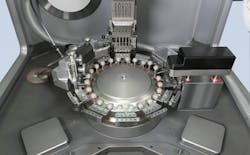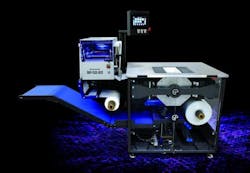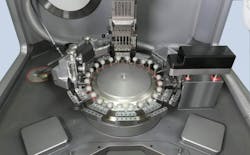Like many areas of pharmaceutical manufacturing, packaging equipment has been undergoing changes. With the rise of personalized medicines and increased demand for smaller batch sizes, packaging systems vendors are more closely considering space, simplicity and flexibility in new designs.
“Packaging machine versatility is becoming more important than speed,” explains John Deitz, president of Deitz Company. “In the past, it was common for large pharmaceutical companies to invest considerably in very high-speed filling and packaging lines dedicated to a single product. But some savvy managers are realizing that it’s better to be nimble and able to fill and/or package more than one product at a time by using two or more packaging lines that may run at a lower speed but also at far less cost.”
Here’s a look at how vendors are adapting packaging systems equipment to the industry’s shifting needs.
SP Thermoforming recently introduced a line of flexible and rigid blister thermoforming machines featuring a carousel design, which helps reduce operating costs.
More Value in Less Space
In manufacturing real estate, every square foot of space can be costly, especially in a clean room environment. In order to shrink their plant size, companies need more compact machinery that can meet still meet complex operational needs.
“[Pharma companies] are moving away from the large, old-fashioned thermoformers toward smaller, compact, portable units that employ radically new operating designs,” explains Bob Hartwig, co-founder of BTS International LLC, the U.S. representative for the new-to-the-scene SP Thermoforming.
As Hartwig notes, many of the newer, smaller thermoforming machines, which heat plastic and then form it into a packaging mold, are not only less expensive, they come with added benefits like energy efficiency.
“Newer, more novel units offer reduced electric consumption for a greener footprint and feature ‘waste-less’ film consumption,” he says.
Packaging Complex Products
Andreas Mattern, director of product management-pharma at Bosch-Packaging Technology points out that newer models also give manufacturers the flexibility they need to package the growing market for personalized medicines.
“Groundbreaking changes are occurring in biological agents for the treatment of cancer, autoimmune diseases, as well as orphan diseases,” Mattern says. “These products are produced in ever smaller batches, requiring especially flexible filling and packaging equipment that can be adapted to new products, as well as different packaging formats quickly with short changeover, cleaning and validation times.”
According to Mattern, the rise in demand for liquid pharmaceuticals has risen in tandem with increased demand for state-of-the-art packaging systems with isolator technology. In the oral solid dose sector, there’s also been higher demand for capsule filling machinery that features robust containment specs, such as Bosch’s GKF 720 filling machine that features a compact design and containment technology that protects the operator, machine and product.
High-potency and combination products are also a growing part of the market for personalized medicine that requires innovative packaging solutions.
“Combination medications have become a popular and convenient choice, allowing consumers to take one dose instead of multiple products,” explains Tim Saarinen, chief operating officer for Maruho Hatsujyo Innovations — the U.S. subsidiary of Maruho Co. Ltd. “Packaging these products can be tricky, as materials need to be tested to ensure appropriate barrier properties for the combination of active ingredients and dosage form. Also, the blister design may need to be adjusted depending on the size of the capsule or tablet for the combination product.”
Mahuro’s small-scale blister packaging machine, MHI’s EAGLE-Uni system, features a universal station that can perform continuous forming and, after an efficient changeover, filling and sealing, and then perforating and punching.
Bosch’s GKF 720 is a high-precision filling machine for small batches that ensures efficient and resource-saving processing for all types of capsules.
Keeping it Simple
Just because new machinery utilizes the latest technology, that doesn’t mean it has to be complicated to use. A simple interface is another key feature vendors are often including with new systems.
“Many customers are having trouble finding people to work in their packaging facilities and/or having trouble training people to operate their filling and packaging lines,” Deitz says.
According to Deitz, their company specifically designed their Pharmafill machines to be easy to set up and use to enable entry-level staffers or other people without packaging or technical backgrounds to operate them safely and effectively.
“We also developed our new human machine interface (HMI) to be clear, simple and intuitively easy to use. It saves machine settings for easy startup and repeatable operation and makes it difficult for people to make costly mistakes,” Deitz says.
As new therapies become more complex, equipment vendors are showing that properly packaging those products doesn’t have to be.
[javascriptSnippet]



